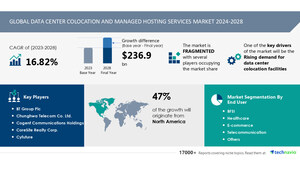NEW YORK, April 19, 2024 /PRNewswire/ -- The global weight loss supplement market size is estimated to grow by USD 2066.13 mn from 2023 to 2027, according to Technavio. The market is estimated to grow at a CAGR of over 6.75% during the forecast period. North America held the largest share of the global market in 2022, and the market in the region is estimated to witness an incremental growth of 29%.
For more insights on the historic (2017 - 2021) and forecast market size (2023-2027) - Request a sample report. To understand more about this market- Download a FREE Sample Report in minutes!
North America is expected to play a pivotal role in propelling the global weight loss supplement market
Geographic Landscape:
The Weight Loss Supplement market in North America is experiencing significant growth, driven by the obese and overweight population's increasing health concerns and the middle-class and working-class populations' pursuit of a perfect body physique. The US, with its larger population, leads the market, while Canada follows suit. The FDA ensures the safety and efficacy of these supplements, which come in various forms, including pills and powders. A recent MDPI study highlighted the role of weight loss supplements in managing obesity-related conditions like hypertension, diabetes, and cardiovascular diseases (CVDs), including stroke and cardiac arrest. However, obstacles like safety concerns, upstream production challenges, and downstream distribution complexities pose business decisions and growth strategies for market players. Meal replacement liquids and powders are popular segments, with the boutique fitness industry and health clubs promoting their use among gym members. Strategic alliances with dieticians and pharmaceutical companies, as well as the pandemic's impact on unhealthy diet habits, further fuel market expansion. Despite these opportunities, the industry must address the challenges of maintaining safety and efficacy while catering to diverse consumer preferences.
Research Analysis
The Weight Loss Supplement Market encompasses various products, including meal replacement liquids and powders, capsules, and dietary supplements. This market caters to the obese and middle-class populations, who are at a higher risk of developing Diabetes and Cardiovascular Diseases (CVDs). Dieticians play a crucial role in recommending these supplements as part of a downstream approach to weight loss. However, regulatory frameworks are essential to ensure the safety and efficacy of these supplements. A recent MDPI study highlighted the potential benefits of weight loss supplements in managing weight and improving overall health. Yet, concerns regarding cardiac arrest and other side effects necessitate careful consideration and qualitative analysis before incorporating these supplements into one's fitness regimen.
Market Drivers
The Weight Loss Supplement market has experienced significant growth due to the global obesity epidemic, with the obese and overweight population reaching unprecedented levels, particularly in the US. Hypertension, diabetes, and cardiovascular diseases (CVDs), including stroke and cardiac arrest, are common health issues associated with obesity. A recent MDPI study revealed that meal replacement liquids and powders, as well as pills, are popular choices among the middle-class and working population seeking to lose weight. However, safety and efficacy remain obstacles, necessitating strategic alliances with dieticians and the boutique fitness industry. The pandemic's impact on unhealthy diets and lack of physical activities has further fueled market growth. The pills segment, including capsules, dominates the market, with the powders segment gaining traction. Business decisions and growth strategies focus on upstream partnerships with raw material suppliers and downstream collaborations with fitness centers, gyms, and health clubs.
Market Overview
The Busineses in the Fitness industry, particularly those dealing with Weight Loss Supplements, have been experiencing significant growth. Cardiovasculars, Dietary Supplements, and Nutraceuticals are key players in this market. These companies offer various products such as capsules, powders, and drinks to help consumers achieve their weight loss goals. The market is segmented based on types of ingredients, including proteins, fibers, and herbs. The use of innovative technology and strategic marketing has contributed to the industry's growth. For instance, some companies have implemented capsule technology for better absorption and faster results. Moreover, the growing awareness of health and wellness has led to an increase in demand for these supplements. However, the industry faces regulatory challenges due to the need for proper labeling and safety standards. Overall, the Busineses in the Weight Loss Supplement market are poised for continued growth as more consumers seek convenient and effective solutions for weight management.
To understand more about this market- Download a FREE Sample Report in minutes!
About Technavio
Technavio is a leading global technology research and advisory company. Their research and analysis focuses on emerging market trends and provides actionable insights to help businesses identify market opportunities and develop effective strategies to optimize their market positions.
With over 500 specialized analysts, Technavio's report library consists of more than 17,000 reports and counting, covering 800 technologies, spanning across 50 countries. Their client base consists of enterprises of all sizes, including more than 100 Fortune 500 companies. This growing client base relies on Technavio's comprehensive coverage, extensive research, and actionable market insights to identify opportunities in existing and potential markets and assess their competitive positions within changing market scenarios.
Contacts
Technavio Research
Jesse Maida
Media & Marketing Executive
US: +1 844 364 1100
UK: +44 203 893 3200
Email: [email protected]
Website: www.technavio.com/
SOURCE Technavio

WANT YOUR COMPANY'S NEWS FEATURED ON PRNEWSWIRE.COM?
Newsrooms &
Influencers
Digital Media
Outlets
Journalists
Opted In





Share this article